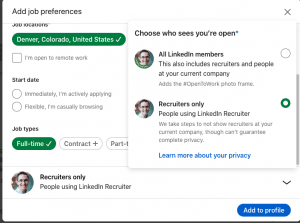What is a Headhunter? How to Partner with an External Recruiter to Land a Job

What is a headhunter, exactly? They may be an untapped resource for your job search. Guest expert Chris Campbell breaks down the differences in internal vs. external recruitment and how to best partner with an external recruiter to land your next job.
Note: Let’s Eat, Grandma is a partner with Smart Job Search (SJS) and may receive commission from SJS purchases made from following links in this article.
By: Chris Campbell | Founder of Smart Job Search
If you’ve been looking for a job for a little while without success… maybe it’s time to think about working with an external recruiter.
“A what?!”
You know, a headhunter. One of those people whose job it is to find you a job.
Want more job search tips? Sign up for our newsletter!
“Hmm… I didn’t think of that. How does that work?”
Let’s break it down.
If the idea of sending in your resume to yet another online job posting causes you to break out in a cold sweat, well, you’re not alone. 73% of people say that looking for a new job is one of the most stressful things in life.
One way to make your job search a little less stressful is to search smarter — not harder — and team up with external recruiters, a.k.a. headhunters, a.k.a. the Jerry Maguires of the job search industry.
Why? Because it’s our job to show you the money.
What is a Headhunter? They’re Your Agent.
There are two types of recruiters.
The first type are internal recruiters who are employed by the company they recruit for; their job is to find their next co-worker. Any time there are openings at their company, the internal recruiter looks for potential candidates for their employer to interview and hire.
External recruiters work independently on behalf of any number of companies (a.k.a. their clients). These recruiters might work for themselves, or they may be employed by an executive recruiting firm. Their job is to find potential candidates for their client to interview and hire.
Internal and external recruiters are similar in that they’re both responsible for recruiting talent for open positions on behalf of companies.
But their differences in internal vs. external recruitment are important for you to know, so you can partner with each type of recruiter in the best ways to support your job search.
Team Internal vs. Team External Recruitment
Internal recruiters are motivated by filling job openings quickly with the right candidate. That’s because they care a lot about their company and the people they work with. They care so much about their company, that they don’t understand what’s going on outside of it. Their view of the public job market tends to be very narrow because they only recruit for one company.
External recruiters, on the other hand, have their finger on the pulse of the job market every. single. day.
External recruiters talk to, work for, and recruit for a lot of companies… so they know which companies are growing and hiring, who is laying off, and who is about to be acquired.
Headhunters know the companies who give good raises, who is freezing their 401k matches, and who will be canceling bonuses this year. External recruiters know which companies allow their employees to work from home (all the time or just in pandemic times), which companies promote from within, and who has a reputation for being the best or the worst place to work.
Headhunters work with multiple companies and will have their fingers on the pulse of the job market. (Photo courtesy of LinkedIn Sales Navigator.)
While internal recruiters are super knowledgeable about their company, external recruiters have to be super knowledgeable about a lot of companies. And that insider knowledge is priceless.
Not to mention, while some internal recruiters may be eligible for bonuses for a job well done, they’re going to get paid a salary whether or not you get a job. External recruiters on the other hand, only get paid (and not by you) if you land a job.
Or in other words: you and your external recruiter(s) are both on offense working towards the same goal. In contrast, an internal recruiter is focused on doing and keeping their job — not necessarily finding you one.
External Recruiters: Your Competitive Advantage.
If you take away only one point from this article, let it be this: from now on, when you’re looking for a job, think of yourself as a highly-coveted free agent athlete and a headhunter as your agent. But unlike the pro athletes, you don’t have to sign any sort of contract that ties you to any one agent in particular.
Let’s say that again, without the sports metaphor.
When you are looking for a job, you can and should be working with multiple external recruiters. Ideally, you want two to three who are strategic, well-known, professional headhunters in the niche or industry you want to work in.
External recruiters are paid a percentage of your annual salary, if and only if, the company they work for hires you. And the higher your salary, the more money your external recruiter will make.
The best part?
External recruiters are not hired or paid by you. They are hired by the company that they are recruiting for, and their contract, agreements, and compensation are taken care of by that company.
Can you imagine what would happen if you had two or three people who are highly connected in your industry, all competing simultaneously to find you your dream job at the highest possible salary?
Game. Set. Match.
Your Game Plan For Working With Headhunters
Now that you know that an external recruiter is an absolute must-have for any smart job search, let’s talk about how to best partner with your external recruiters.
The best game plan is one where everyone wins, and you can do that by building the right kind of relationship with the right kind of recruiters.
The Recruiters You Want On Your Team: What Makes a Good Headhunter
Simply put, the right kind of recruiter for you is one who cares about you and your career success.
Some external recruiters are very transactional. They look at you and see only dollar signs instead of a human being whose career is important.
It’s clear from the get-go that they operate at warp speed. They press you to give them your resume without even getting on the phone with you. Or if they get on the phone, they try to fit what should be a 15-minute conversation into a 5-minute call.
Try to partner with an external recruiter who will go on offense with you to find the right job, and watch out for these warning signs. (Photo courtesy of LinkedIn Sales Navigator.)
These transactional recruiters spend little time getting to know you. They don’t care about your career goals, what’s driving your search, what type of companies you’re interested in.
These are the recruiters who think of their job as a numbers game. The more resumes they can throw at their client (the company that hired them) the better, regardless of whether it’s a good fit for you or the company.
These are also the recruiters who might try to convince you that you can only work with them (not true) or will send your resume to companies without telling you.
A golden rule of engagement when working with external recruiters is that they’re not supposed to send your resume to anyone without your permission. So if this happens, run. Fast.
The right kind of recruiters will take the time to get to know you. Why? Because they care about their reputation and they know that the better job they do at finding the right candidate for their client, the more likely they are to keep their clients.
The right kind of external recruiter will spend time learning what you want out of your career, what type of company is a good fit for you, and what you’re passionate about. They’ll ask you thoughtful questions about your resume, and expect you to do the same about the jobs that they’re interviewing you for.
The best type of external recruiter is one who has a winning record in your desired industry. This would be a headhunter that can easily show you the companies they recruit for and what jobs they’ve filled in the last three to four months.
It will be obvious very quickly if they are a recruiter who is carefully placing talented people at the type of companies and in the type of roles that you want, or if they’re just trying to fill as many seats as quickly as possible.
And in case it’s not obvious, ask the recruiter if they currently have any openings that are a match for your skill set. The good ones will give you an honest and direct answer.
Foul Plays: The Rules Of The Game
The best relationships are built on honesty, trust, good communication, and reciprocity — so keep that in mind when working with external recruiters. Here are four tips for facilitating those types of relationships:
1.) It begs repeating, but watch out for anyone who sends your resume without your permission.
2.) Keep in touch with your recruiter even when you’re not looking for a job. Don’t just call when you’re out of work asking what jobs they have for you. Check in regularly and ask how they are, and how you might be able to support them.
3.) Be open and honest about your skills and experience. If a job is not a good fit, say so, and then refer them to your colleague who is a good fit. One of the BEST ways to build a win-win relationship with an external recruiter is by making thoughtful introductions to people in your network and helping them fill roles that you’re not interested in.
4.) Proactively communicate that you’re working with other headhunters. Yes, they expect this, but it’s a nice thing to let them know. Plus, it gets their competitive juices flowing.
How To Find The Right Headhunters Today
If you want to work with an external recruiter (and get noticed by internal recruiters for that matter), your first step is to make your LinkedIn profile visible to them.
The easiest way to find external recruiters is to let them find you. Recruiters spend hours on LinkedIn every day, and they are looking for you.
Make sure your LinkedIn profile is updated with the latest and greatest stats and wins from your career and make sure you go into your dashboard and turn the “Open Candidates” feature ON. This lets serious recruiters (the ones that pay for premium access) know that you’re open for opportunities without having to disclose that publicly to your boss on your profile.
After you update your LinkedIn profile and Open Candidate settings, look at your connections, and see who you really trust. Then, reach out and confidentially ask if they have any referrals for an external recruiter that they liked and that works in your industry or niche.
Bonus points if they have an HR or Recruiting related title (because these people tend to know a lot of recruiters). These people can often connect you with opportunities on the hidden job market that are open but not publicly advertised.
Because yes, that’s a thing you’re up against, too.
External Recruiting in a Pandemic
External recruiters were important before. Now, with COVID-19, the need for you to have two to three strategic headhunters on your team has been amplified in an unprecedented way.
Their connections, their pulse on the job market, their mutual interest in placing you at a company and in a job that you’re going to love (and getting you that well-deserved pay raise) should not be underestimated given the amount of competition in the job market right now.
Now, go update that LinkedIn profile and build yourself a winning team of external recruiters. Remember, you’re a coveted all-star player, and there’s an agent out there who wants to sign you!
Need more help to start partnering with an external recruiter? Feeling curious about the hidden job market, or motivated to ditch those job boards and step up your networking game? Check out my Smart Job Search course — it’s been designed to help you find your dream job the smart way, not the hard way.
About the Author

Through holding nearly every job title in the job market over the past two decades, Chris has guided thousands of job-seekers on how to achieve their career aspirations using the Smart Job Search System. This high-caliber online course teaches how to find and land a fulfilling job using effective, tech-forward strategies.
Chris is also founder and CEO of EQ Search and leads an executive recruitment team focused on the Life Science and Healthcare industries. He lives in Pennsylvania with his wife, two kids, and lots of soccer equipment.
Want more job search tips sent straight to your inbox? Sign up for our newsletter here:
Better Resume.
Satisfying Career.
Happier You.




